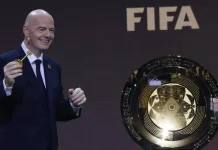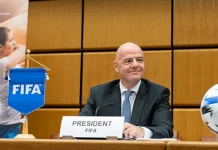FIFA’s decision to award the 2034 World Cup to Saudi Arabia has reignited global concerns about the organization’s commitment to ethical governance and transparency. Opponents say the process of selection was vaguely transparent and is in violation of international human rights conventions, which was codified in a May 2025 complaint to Swiss officials by international law scholars Mark Pieth, Stefan Wehrenberg, and Rodney Dixon. They argue that FIFA has engaged in a breach of its own rules because it does not ensure that host countries respect basic rights, which are reminiscent of previous scandals concerning the Qatar 2022 and Russia 2018 events, where the country hosting the games was chosen because of their geopolitical and economic reasons rather than ethical ones.
Although few European football federations have shown resistance to Qatar early on, the selection of Saudi Arabia has been met with barely vocal objections or, rather, tentative appreciations because of the ongoing efforts to reform the kingdom under the Vision 2030. The German and the Danish FAs have presented their case as pragmatic and based upon the available opportunities of engagement and influence. Such stands have however caused uproar among their own, as well as by the civil society, creating a dilemma between the strategic compatibility and the ethical responsibility of the sport. Rising unease shows overdue calculation in football on its nature with authoritarian states and the value of its worldwide rule.
FIFA’s Governance and Transparency Deficits
Procedural Irregularities and Lack of Oversight
How FIFA announced the 2030 and 2034 World Cup during 2024 raised great alarm among the member associations, and the observers. The two awarded, during one and the same sitting, with scant deliberation, were not what FIFA would have anticipated in terms of making competitive and open bidding transparent. In showing the decisions as fait accomplis, FIFA further compromised its governance structures and excluded stakeholders in favor of due processes.
Such a feeling of callousness at the institutional level has battered the trust in the leadership of FIFA president Gianni Infantino. Critics claim that institutional reforms implemented in the organization after the 2015 corruption scandal have been inadequate to eliminate decision-making driven by an abundance of political logic and financial alliances. Without structural safeguards and independent review mechanisms, FIFA’s credibility as an ethical and inclusive steward of the game remains tenuous.
Human Rights Challenges Linked to Host Nations
Saudi Arabia’s Human Rights Record Raises Concerns
The selection of Saudi Arabia has attracted more light on the internal human rights condition in the country. Several bodies like Human Rights Watch and Amnesty international have consistently reported the prohibition of dissent, media freedoms, and discriminatory policies against women and the LGBTQ + peoples. The migrant workers, particularly in mega infrastructure projects have continued to experience an on-going dispute regarding their treatment, although the government has asserted that it has reformed.
Though the Saudi Vision 2030 provides an agenda of modernization that comprises social and economic liberalization, numerous observers warn that such actions do not promise any significant change. The World Cup has fears that it will just be used as a PR exercise and not an improvement factor. The would-be Qatar 2022, whose promised changes saw uneven implementation and most of them unmonitored, still guiding these concerns.
Federation Responses and Independent Monitoring Proposals
Certain European federations have been asking FIFA to install some independent monitoring systems where they could monitor the condition of human rights when preparing and delivering the tournament. Nonetheless, such oversight is questionable in a place considered to have minimal civil liberties. The ability of FIFA to exercise accountability even in situations where the host nations are enjoying sovereign powers is also questionable as was witnessed in previous events of mismatch in labor rights and media freedom that characterized global events.
And such tension shows a persistent question; although football wants to be apolitical when it comes to its rhetoric it cannot afford to be disconnected on the bigger picture since it operates in global arenas that force it to become a part of the game. That bid and how FIFA reacts to the criticisms will be a signal of whether or not sport can seriously consider the human rights agenda without compromising its economic or diplomatic interests.
Political Calculations in Global Sports Diplomacy
Normalization Through Sport and Soft Power
FIFA’s decisions are increasingly seen through the lens of soft power and geopolitical strategy. Hosting the World Cup offers governments an unparalleled opportunity to reshape their global image. In the case of Saudi Arabia, the tournament aligns with efforts to present the kingdom as a dynamic, reform-oriented society attractive to investors and international partners. Critics view this as a form of “sports washing,” where hosting rights help obscure ongoing rights violations.
This strategy has become more prominent in recent years. Qatar’s massive investments in global sports institutions—including club ownership and league sponsorships—established a successful model of influence that Saudi Arabia now appears to emulate. FIFA’s endorsement of these bids, whether through silence or cooperation, plays a pivotal role in legitimizing them to a global audience.
Public Opinion and Civil Society Pushback
The 2025 public discourse surrounding the Saudi World Cup reveals growing frustration among fans and advocacy groups. Activists, particularly from migrant rights and LGBTQ+ communities, argue that FIFA must redefine the criteria it uses to evaluate host bids. Rather than simply encouraging aspirational reform narratives, they call for enforceable guarantees, open civic participation, and transparency in state collaboration.
Civil society’s engagement in host country debates has intensified with digital activism and media attention. Posts like that of legal analyst @granberg15954 on July 18, 2025—stating,
“Even with convictions, enforcement remains scattered and too lenient… Until workers are seen as participants in the value chain—not expendable inputs—the cycle will persist”
reflecting a deepening skepticism about top-down reform promises. This sentiment resonates well beyond the football community, intersecting with broader conversations on global labor, governance, and corporate ethics.
External Policy Pressures and Internal Sport Dynamics
Legal Pressure and the Risk of Litigation
The legal complaint filed in Switzerland by Pieth and others represents a novel approach to holding FIFA accountable. Unlike previous criticisms lodged through media or civil protest, the complaint attempts to use legal precedent to define FIFA’s obligations under international human rights frameworks. If the Swiss authorities pursue the case, it could set a significant precedent affecting not only future World Cup bids but also the governance practices of other international sporting bodies.
Whether the complaint results in formal action or not, it underscores a critical development in global sports governance: the move from advocacy to legal intervention. FIFA’s response to this shift—both in public messaging and in structural reforms—will shape its legal and reputational standing for years to come.
Internal Strains Within Global Football
In addition to the externalities, FIFA encounters problems in the football ecosystem. The game played by players has strained calendars, injured bodies and seen concentration of power among officials of FIFA as the unions, national federations of various countries and club officials express their problems. These tensions have been heightened by decisions made on tournament scheduling, such as those, which surround the 2025 Club World Cup.
Disputes about eligibility, transportation and match rankings have affected bigger clubs and national sides making them bitter. The large clubs such as Liverpool and Barcelona being denied entry into top-rated FIFA tournaments and games because of the limiting or vague qualification procedures have elicited rants and impact the fandom. A well founded decision (by its nature often treated as a technical decision) is used when considering a governance problem in the structures of the leadership of a sport.
Long-Term Implications for Football’s Global Role
FIFA finds itself in a tunnel today because it is facing a crossroad between what it is or ought to be as a unifying cultural organization and the conduct of a geopolitical agent. Such hosting decisions as one of Saudi Arabia signify that the organization has been heavily entangled with state interests and economic power. Long-term concerns to the legitimacy of FIFA are the lack of clarity in ethics of these decisions among its youthful fans and other new markets where transparency and social relevance are of growing importance.
The manner in which FIFA will get through this will define how much of a hold they will have not only in the game of football, but also on international cultural diplomacy as a whole. Will the organization institutionalize the reformation by compulsorily enforcing human rights and democratic governance during its selection? Or will it go on a course on which strategy and commercial profit supersede integrity?
We are at a reckoning point when these questions, boosted by legal claims, activism, and changes in popular expectations, are arousing much alarm. In its ability to inspire, the power to connect, football will always have a special opportunity to play a leading role as an example. It is not quite clear whether FIFA will step up to the occasion.












